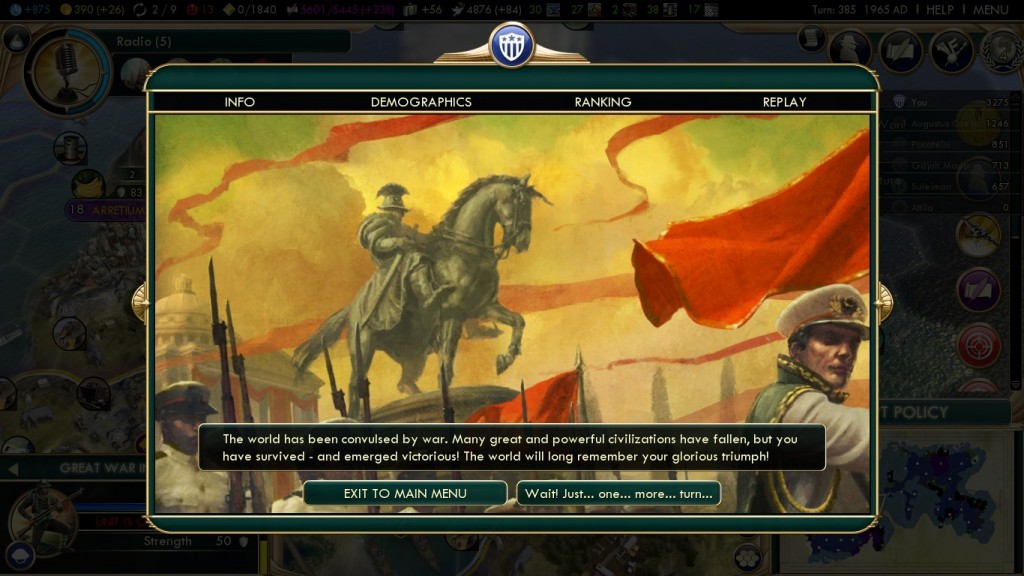by Johnathon A. Froman
Note: Recommended only for those who have or are planning to buy the complete edition of Civilization V, NOT the base game by itself.
Introduction.
Sid Meier’s Civilization V is a finely crafted turn-based strategy game developed by Firaxis Games and published by 2K Games and Aspyr, released on September 21st, 2010. Civilization V is the fifth in a series of installments inspired by Sid Meier and based on building a civilization from real history that can stand the test of time. After critically acclaimed success, the games has produced two expansions: Gods & Kings (Released June 2012) and Brave New World (July 2013) as well as several DLCs which add even more depth to the already complex and entertaining game. The game has both singleplayer and multiplayer modes and is available for Windows and Mac computers.
Pricing.
Here is a table of some of the prices for Civilization V and its expansions and DLCs. Keep in mind that on platforms such as Steam and Humble Bundle, you’ll find many times that this popular title will go on sale.
| Base Game | $29.99 |
| Complete Edition (Base game + all DLCs and Expansions | $49.99 |
| Gods and Kings (First Major Expansion) | $29.99 |
| Brave New World (Second Major Expansion) | $29.99 |
| Cradle of Civilization (DLC Pack) | $9.99 |
Civilizations.
In Civilization V, you possess the option to choose from a large variety of civilizations to play as. The base game has 18 available nations to choose from. Expansions and DLCs will improve the number of options to 43 total civilizations. Ranging from America led by George Washington to Rome led by Augustus Caesar and to France led by Napoleon, the Civilizations, or Civ for short, have vastly differing playstyles, most likely because each Civ possess three unique attributes:
First, there is the Unique Ability (UA). Each civ has a unique gameplay mechanic that provides them with a bonus that are usually geared toward one or more Victory Conditions (see next section). The UA is active the entire game, however its efficiency may vary depending on the Era your Civ sits in. For example, the Aztec’s Unique Ability is called Sacrificial Captives which “[g]ains Culture for the empire from each enemy unit killed.”
Secondly, the Unique Unit (UU). Each Civ, when they reach the technological capabilities, can build in their cities. All Civs have at least one UU, but some have two, such as Rome. Each UU replaces a generic unit of the Era of which your Civ can build this unit. These UUs can be stronger and more versatile than generic units in the Era they belong in. However, after progressing to further Eras, you can promote this UU along with your generic units to their next advancement and the promoted UU will keep their unique bonuses. For instance, the UU for Poland are the Winged Hussars,a mounted melee unit that is slightly stronger than its generic counterpart, the Lancer.
 Thirdly, the Unique Building (UB). Most Civs have a UB they can build, but some have Unique Tile Improvements instead. However, Civs that have two UUs cannot have a UB. For example, the Egyptians are the only Civ that can build the Burial Tomb, which provides Culture and Faith, but grants double Gold to enemies that capture the city, should they do so.
Thirdly, the Unique Building (UB). Most Civs have a UB they can build, but some have Unique Tile Improvements instead. However, Civs that have two UUs cannot have a UB. For example, the Egyptians are the only Civ that can build the Burial Tomb, which provides Culture and Faith, but grants double Gold to enemies that capture the city, should they do so.
Lastly, all Civs have a starting bias. This attribute is not unique and can be shared across multiple Civs. The starting bias influences the terrain your Civ starts around when they first enter the game. One example is the English Civ, whose starting bias is Coast terrain.
Winning the Game.
When playing Civilization V, you have the ability to change the course of history as you know it. When starting your first singleplayer games, you are thrown into a map along with other civilizations controlled by AI. In order to win, you must progress your people and win through a Victory Condition. There are five victory conditions: Science, Domination, Culture, Diplomatic, and Time.
The most basic victory is the Time Victory. Time Victories are won by scoring the most points—calculated by a very large number of variables such as gold in your storage, number of troops and cities, and strength of your religion and culture—in a game before a certain number of turns. The default for Time victories is the year 2045 AD, but the option to change the amount of turns is available in the Advanced Settings menu when you start the game. However, I would personally recommend turning off Time victory (also available in the Advanced Settings menu) as I have found during my game that it is the most incredibly boring of all the victory types. The option to disable the other victories are present, but you must have at least one type checked before starting a game.

Part Two coming soon.